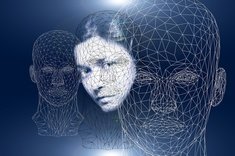|
Hint
|
|
Answer
|
|
An emotion characterized by feelings of tension, worried thoughts, and physical changes like increased blood pressure.
|
A
|
Anxiety
|
|
A range of mental processes relating to the acquisition, storage, manipulation, and retrieval of information.
|
C
|
Cognition
|
|
A repetitive behavior or mental act that a person feels driven to perform in response to an obsession.
|
C
|
Compulsion
|
|
A logical approach whereby one uses general observations to make specific conclusions.
|
D
|
Deductive reasoning
|
|
A mental process where a person disconnects from their thoughts, feelings, memories or sense of identity.
|
D
|
Dissociation
|
|
In psychoanalytic theory, that portion of the human personality which is experienced as the “self” or “I” and is in contact with the external world through perception.
|
E
|
Ego
|
|
A conscious mental reaction subjectively experienced as a strong feeling usually directed toward a specific object and typically accompanied by physiological and behavioral changes in the body.
|
E
|
Emotion
|
|
The ability to both manage one’s own emotions and understand the emotions of people around one.
|
E
|
Emotional intelligence
|
|
The gradual weakening of a conditioned response that results in the behavior decreasing or disappearing.
|
E
|
Extinction
|
|
The psychoanalytic technique of allowing a patient to discuss, without input or direction, thoughts, dreams, memories, or words, regardless of coherency, in order to analyze current issues.
|
F
|
Free association
|
|
A person's internal and individual sense and experience of gender.
|
G
|
Gender identity
|
|
A decrease in response to a stimulus after repeated presentations.
|
H
|
Habituation
|
|
A false perception of objects or events involving one’s senses.
|
H
|
Hallucination
|
|
A type of cognitive bias in which our overall impression of a person influences how we feel and think about their character.
|
H
|
Halo effect
|
|
In psychoanalytic theory, the primitive and instinctive component of personality.
|
I
|
Id
|
|
Orientation toward the internal private world of one’s self and one’s inner thoughts and feelings, rather than toward the outer world of people and things.
|
I
|
Introversion
|
|
In psychoanalytic theory, psychic drive or energy, usually conceived as sexual in nature, but sometimes conceived as including other forms of desire.
|
L
|
Libido
|
|
A repeated thought, urge, or mental image that is intrusive, unwanted, and that may cause anxiety.
|
O
|
Obsession
|
|
A period of extreme anxiety and physical symptoms such as heart palpitations, shakiness, dizziness and racing thoughts.
|
P
|
Panic attack
|
|
An overwhelming and debilitating fear of an object, place, situation, feeling or animal.
|
P
|
Phobia
|
|
The process of rewarding or reinforcing desirable behavior in order to increase the likelihood that the behavior will be repeated in the future.
|
P
|
Positive reinforcement
|
|
A defense mechanism by which an individual unconsciously attributes their behaviors, emotions, impulses, undesirable characteristics, and thoughts to others.
|
P
|
Projection
|
|
The loss of at least some contact with reality, possibly involving hallucinations, delusions and/or disorientation.
|
P
|
Psychosis
|
|
A defense mechanism whereby one attempts to justify behaviors, thoughts or feelings with a logical (but false) explanation.
|
R
|
Rationalization
|
|
A tendency to fill in gaps in our memory with information we learned after the event, and to believe the “filler” represents actual memories.
|
R
|
Reconstruction
|
|
A defense mechanism by which unpleasant emotions, impulses, memories, and thoughts are pushed out of conscious awareness.
|
R
|
Repression
|
|
Any agent, event, or situation — internal or external — that elicits a response.
|
S
|
Stimulus
|
|
Anything, internal or external, that applies psychological pressure on an individual.
|
S
|
Stressor
|
|
In psychoanalytic theory, the ethical component of the personality that provides the moral standards by which the “self” operates.
|
S
|
Superego
|
|
The vast sum of operations of the mind that take place below the level of conscious awareness.
|
U
|
Unconscious
|

